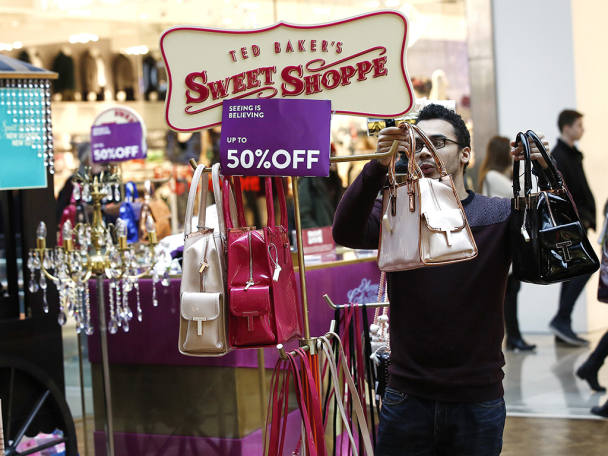- Ted Baker and Superdry have been dealt blows by the pandemic, but their problems began long before this year.
- The companies are not cheap enough to compete with fast fashion, nor desirable enough to compete with luxury.
- Both retailers want to revamp their brand but investors will have to wait to see if they become trendy again.
Enter Superdry’s (SDRY) online store and on the homepage is an image of its trademark hoodies and t-shirts arranged in slightly haphazard piles. For a “limited time only”, it's three for two on more than 1,000 “tees, tops and sweats”.
The retailer, like its London-listed peer Ted Baker (TED), has been slashing prices in response to a sales drought brought on by the coronavirus pandemic. With these companies’ valuations also spiralling downward in recent years, the question for investors is whether their shares are also near enough to the bargain bucket to be worth snapping up.
Ted Baker’s share price has fallen more than a tenth since Monday, when it revealed pre-tax losses almost quadrupled year on year in the 28 weeks to August, to £86m. Revenues nearly halved over the period, but the losses were also compounded by falling margins as the company tried to lure consumers with discounts on its backlog of “aged stock”.
Superdry reported similar woes last month, when it said sales were down almost a quarter in the 13 weeks to October compared with the same period last year. Its shares are trading at less than a sixth of their peak price in 2017.
Both companies have suffered as recurring high street lockdowns shuttered their physical stores. Ted Baker was dealt a particularly hard blow as the suspension of social events hit demand for its signature formalwear. But these brands were losing touch before the virus struck.
Superdry has now seen four consecutive years of declining profits. Ted Baker has seen three. The former has been rattled by internal drama since the ousting and recent reinstatement of its chief executive, while the popularity of the latter suffered following allegations of misconduct against its founder. Ray Kelvin has denied the accusations.
After years of success, they’re also playing catch-up with retail’s latest models. Other businesses have not fared as badly after heading into this year with less dependence on physical stores – country fashion brand Joules (JOUL) just reported a smaller drop in revenues in the six months to November, bolstered by sales through its e-commerce channels increasing by nearly half.
Meanwhile, fast-fashion retailer Boohoo (BOO) overhauls its range every season with the latest styles offloaded for a nickel and a dime – Superdry and Ted Baker are still trying to shift old stock with heftier price tags. That’s without the same perennial demand for their logos as luxury brands, which even the less affluent can snap up today from a string of secondhand online retailers.
With shoppers diverging from mid-market stores, even after surviving the battle of the pandemic, both companies may find themselves stranded in retail no man’s land: not cheap enough to compete with fast fashion, nor desirable enough to be deemed a luxury brand. For a makeshift economic indicator, look at retailers’ popularity on social media. High-end Burberry (BRBY) and Associated British Food’s (ABF) budget brand Primark have 17.8m and 8.7m Instagram followers, respectively. Ted Baker and Superdry have less than 2m between them.
In its latest report, Ted Baker said it was left with 38 tonnes of “terminal stock” that it decided to send to charity. But the company, which has been running its stock on a three-year cycle, is attempting a makeover, deviating from its reliance on formalwear and launching a new range that can follow trends more closely by dropping four times a year. Its new female chief executive should also be a welcome appointment after the recent harassment allegations.
The firm itself warns the positive impact of its new direction will not be tangible until the summer, although with shares festering near an all-time low we say investors should keep their eyes peeled while holding at 126p.
Superdry has also been trying on a new style. Reinstated chief executive Julian Dunkerton has declared intentions to “reset” the business, unveiling more contemporary ranges with a focus on sustainability. With its share price increasing more than fourfold since its March nadir, investors may be betting it can become trendy again. But it's hard to be this optimistic yet, so we say sell at 255p.
| TED BAKER (TED) | ||||
| ORD PRICE: | 125p | MARKET VALUE: | £ 231m | |
| TOUCH: | 122-123p | 12-MONTH HIGH: | 370p | LOW: 60p |
| DIVIDEND YIELD: | Nil | PE RATIO: | NA | |
| NET ASSET VALUE: | 374p | NET CASH: | £61m | |
| 28 weeks to 8 Aug | Turnover (£m) | Pre-tax profit (£m) | Earnings per share (p) | Dividend per share (p) |
| 2019 | 313 | -23.0 | -46.1 | 7.8 |
| 2020 | 169 | -86.4 | -64.1 | nil |
| % change | -46 | - | - | - |
| Ex-div: | na | |||
| Payment: | na |









